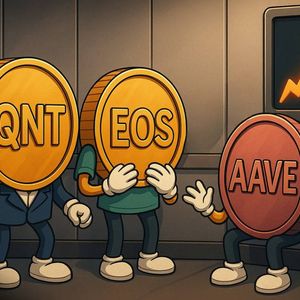Are you involved in the world of cryptocurrencies, NFTs, or other digital assets? If so, a significant development out of the state of Oregon should definitely be on your radar. Oregon has just made a pioneering move that could reshape how digital assets are viewed and utilized within traditional finance and commerce. This development, centered around the Oregon digital assets law, specifically Senate Bill 167, updates the state’s Uniform Commercial Code (UCC) to formally recognize these modern forms of value. Understanding the Significance of the UCC Digital Assets Update Before diving into the specifics of Oregon’s law, let’s quickly touch upon what the Uniform Commercial Code (UCC) is and why its update is such a big deal for digital assets. The UCC is a set of standardized laws governing commercial transactions in the United States. It covers everything from sales and leases to negotiable instruments and, crucially, secured transactions. Think of it as the foundational legal framework that makes business run smoothly across state lines. Historically, the UCC was designed for tangible goods and traditional financial instruments. Digital assets, being intangible and often decentralized, didn’t fit neatly into these existing categories. This lack of clarity created significant legal uncertainty, making it difficult, if not impossible, to use digital assets in standard commercial activities like using them as collateral for a loan. The UCC digital assets update in Oregon aims to bridge this gap, providing a clear legal basis for dealing with these assets. Oregon’s Landmark Digital Asset Legislation: What Does SB 167 Do? Oregon’s Senate Bill 167, signed into law by Governor Tina Kotek on May 7th, is a comprehensive piece of digital asset legislation. Its primary function is to amend various articles within Oregon’s version of the Uniform Commercial Code to explicitly include and define ‘digital assets’. Key aspects of the bill include: Formal Recognition: The law legally recognizes digital assets, including cryptocurrencies (like Bitcoin and Ethereum), tokenized records (representing ownership of other assets), and electronic money, as types of property that can be dealt with under the UCC. Collateral Usage: A major outcome is that digital assets can now be legally used as collateral in secured transactions. This means individuals and businesses in Oregon can potentially use their crypto holdings or other digital assets to secure loans or other financial obligations, just like they would with real estate or traditional securities. Defining Control: The bill introduces new concepts and definitions, such as how ‘control’ over a digital asset is established, which is crucial for determining ownership and priority in secured transactions. Transition Provisions: The law includes guidelines for how existing agreements involving digital assets should be handled under the new framework, aiming to minimize disruption. This legislative update is a direct response to the growing importance of the digital asset space and the need for legal frameworks that keep pace with technological innovation. By updating the UCC, Oregon is providing a level of legal certainty that was previously missing. Unlocking Value: How Cryptocurrency Collateral Becomes a Reality One of the most exciting implications of the Oregon digital assets law is the formal pathway it creates for using cryptocurrency collateral. Before this, while some platforms offered crypto-backed loans, the legal standing of the collateral under state commercial law was often ambiguous. This new law changes that. Consider a small business owner in Oregon who holds a significant amount of cryptocurrency. Under the old framework, getting a traditional bank loan might require using physical assets or real estate as collateral. Now, they may have the option to use their crypto holdings. This opens up new avenues for liquidity and financing, potentially making it easier for businesses and individuals to access capital without having to sell their digital assets. This also has implications for the broader financial ecosystem. Banks and other lending institutions in Oregon now have a clearer legal basis for accepting digital assets as collateral, potentially leading to the development of new financial products and services. The ability to use cryptocurrency collateral within a recognized legal structure reduces risk for lenders and could increase the utility and adoption of digital assets. Oregon’s Place in the Evolving Crypto Law US Landscape Oregon isn’t the only state grappling with how to regulate digital assets, but its approach through the UCC is particularly significant. By integrating digital assets into this fundamental commercial code, Oregon is providing a template that other states might follow. This is crucial for the development of a coherent crypto law US framework. Different states have taken varied approaches to digital assets, ranging from specific money transmission licenses for crypto businesses to property tax rules. However, updating the UCC directly addresses the core commercial viability of these assets. This move by Oregon could encourage more widespread acceptance and use of digital assets in everyday commerce and finance across the country, provided other states adopt similar measures. What Are the Potential Benefits and Challenges? Oregon’s Oregon digital assets law brings several potential benefits: Increased Certainty: Provides much-needed legal clarity for owners, users, and potential lenders dealing with digital assets. Enhanced Liquidity: Allows digital asset holders to access capital without selling their assets by using them as collateral. Innovation: Encourages the development of new financial products and services built around digital assets within a clear legal framework. Economic Growth: Positions Oregon as a forward-thinking state in the digital economy, potentially attracting businesses and investment in the blockchain and crypto sectors. However, challenges remain: Valuation Volatility: The price volatility of many digital assets can still pose risks for lenders accepting them as collateral. Enforcement Across Jurisdictions: While Oregon’s law is clear within the state, enforcing rights related to digital assets held or transacted across state or international borders could still present complexities. Technological Understanding: Lenders and legal professionals need to develop expertise in understanding the technology and risks associated with different types of digital assets. Looking Ahead: The Future of Digital Asset Legislation Oregon’s move is a significant step, but it’s part of a larger, ongoing conversation about how to regulate digital assets effectively and safely. This digital asset legislation in one state could act as a catalyst for other states to accelerate their own efforts to update commercial laws. Furthermore, it highlights the need for potential federal guidance or coordination to ensure a consistent legal environment for digital assets across the United States. As the digital asset space continues to evolve, we can expect more legislative efforts aimed at providing clarity, protecting consumers and investors, and enabling the safe and effective use of these innovative technologies within the existing legal and financial systems. In Conclusion: A Monumental Step for Oregon and Beyond Oregon’s passage of Senate Bill 167 and its subsequent update to the Uniform Commercial Code is a landmark development. By formally recognizing digital assets and allowing them to be used as cryptocurrency collateral, the state has taken a decisive step towards integrating the digital economy into traditional commercial law. This provides much-needed clarity, reduces legal uncertainty, and opens up new possibilities for individuals and businesses dealing with digital assets in Oregon. While challenges remain, this pioneering piece of digital asset legislation sets a precedent that could influence the future of crypto law US and accelerate the mainstream adoption of digital assets across the nation. To learn more about the latest digital asset legislation trends, explore our articles on key developments shaping cryptocurrency collateral institutional adoption.

















